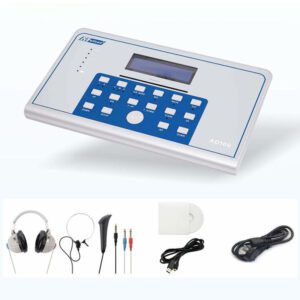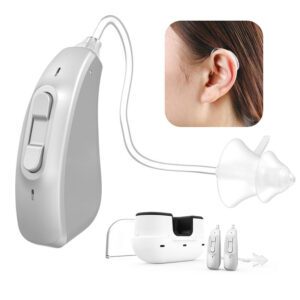
By the time we reach 65, one in three of us will have a hearing impairment.
Source: National Institutes of Health
Hearing Loss affects people of all ages and can be caused by many different factors.
Types of Hearing Loss
There are three types of hearing loss
- Sensorineural Hearing Loss: This is the most common type of hearing loss. This type of hearing loss can occur when the inner ear or the actual auditory nerve itself is damaged, or when some of the hair cells inside the cochlea are damaged.
- Conductive Hearing Loss: This type of hearing loss is usually temporary and often cured with wax removal, medication, or surgery.
- Mixed Hearing Loss: just what it sounds like – a combination of sensorineural and conductive hearing loss.
Causes and Treatment of Hearing Loss
Causes of Sensorineural Hearing Loss
- Exposure to loud noise (preventable but not reversible – see more about prevention)
- Aging (presbycusis)
- Head trauma
- Virus or disease
- Autoimmune inner ear disease
- Heredity
- Malformation of the inner ear
- Ménière’s disease
- Otosclerosis
- Tumors
Treatment of Sensorineural Hearing Loss
- Sudden sensorineural hearing loss (SSHL) is thought to be of viral origin and is an otologic emergency requiring medical treatment with corticosteroids.
- Corticosteroids may also be used to reduce swelling and inflammation of cochlear hair cells after exposure to loud noises.
- Sensorineural hearing loss can be caused by head trauma or a sudden change in air pressure (for example, an airplane descent), which can cause a rupture or leak in the fluid chambers of the inner ear, which can be toxic to the inner ear. When this happened, emergency surgery was performed with varying degrees of success.
- Bilateral progressive hearing loss for several months, also diagnosed with autoimmune inner ear disease, treated medically with long-term corticosteroids and sometimes medications. Autoimmune inner ear disease is when the body’s immune system misdirects its defenses against the inner ear structures, resulting in damage to this part of the body.
- Fluctuating sensorineural hearing loss may be of unknown cause or associated with Meniere’s disease. Symptoms of Meniere’s disease are hearing loss, ringing in the ears (tinnitus), and vertigo. Meniere’s disease can be treated medically with a low-sodium diet, diuretics, and corticosteroids. If vertigo is not controlled medically, various surgical procedures can be used to eliminate vertigo.
- Sensorineural hearing loss due to central nervous system disorders may respond to medical management of specific disorders affecting the nervous system. For example, hearing loss secondary to multiple sclerosis can be reversed by treating multiple sclerosis.
- Irreversible sensorineural hearing loss is the most common form of hearing loss and can be managed with Hearing Aids. This type of hearing loss can be treated with cochlear implant surgery when Hearing Aids are not enough.
Causes of Conductive Hearing Loss
- Malformation of the outer ear, ear canal, or middle ear structure
- Fluid in the middle ear from colds
- Ear infection (otitis media – a condition of the middle ear in which an accumulation of fluid may interfere with the movement of the eardrum and ossicles)
- Allergies
- Poor Eustachian tube function
- Perforated eardrum
- Benign tumors
- Impacted earwax
- Infection in the ear canal
- Foreign object in the ear
- Otosclerosis (a hereditary disorder in which a bony growth forms around a small bone in the middle ear, preventing it from vibrating when stimulated by sound)
Treatment of Conductive Hearing Loss
- Surgery may correct conductive hearing loss that is due to the congenital absence of the ear canal or failure of the ear canal to be open at birth, congenital absence, malformation, or dysfunction of the middle ear structures (i.e. from head trauma), and otosclerosis.
- Amplification may be a solution with the use of a bone-conduction hearing aid, a surgically implanted, osseointegrated device (for example, the Baha or Ponto System), or a conventional hearing aid, depending on the status of the hearing nerve.
- Antibiotic or antifungal medications are used to treat chronic ear infections or chronic middle fluid. Tumors usually require surgery.
Causes of Mixed Hearing Loss
Mixed hearing loss is caused by a combination of conductive damage to the outer or middle ear and sensorineural damage to the inner ear (cochlea) or auditory nerve.
In some cases, a person may have both sensorineural and conductive hearing loss. In this case, the problem is classified as mixed hearing loss. Mixed hearing loss affects both the inner ear and the outer or middle ear, so it causes more severe hearing loss.
Treatment for Mixed Hearing Loss
Treatment will vary depending on the severity of the hearing loss, but hearing aids and cochlear implants may be required in addition to surgery.
Audiologists recommend dealing with conductive parts first. Sometimes adding a conductive component makes a person a better hearing aid candidate, for example, by flattening the audiogram while the underlying sensorineural component suffers from high-frequency loss. However, the focus will still be on treating what can be treated medically. Usually, you can expect positive results.


